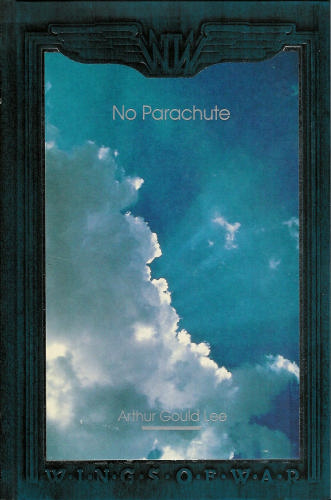Arthur Gould Lee, No Parachute
Product Details
- Hardcover: 233 pages
- Publisher: Time Life Education (June 1991)
- Language: English
- ISBN-10: 0809496127
- ISBN-13: 978-0809496129
- Product Dimensions: 8.4 x 5.6 x 1 inches
- Shipping Weight: 1.1 pounds
- Average Customer Review: 4.8 out of 5 stars (9 customer reviews)
- Price: $48.80 plus shipping
1. Short review:  (Amazon rating: 5 out of 5 stars -- I love it.)
(Amazon rating: 5 out of 5 stars -- I love it.)
 (Amazon rating: 5 out of 5 stars -- I love it.)
(Amazon rating: 5 out of 5 stars -- I love it.)
2. Long review:
2.1. What I liked: The contemporaneous account by a flyer in the Great War. Of all the books I have read on air combat in the Great War, No Parachute is the best. Roller-coaster or walk-in-the-park? Roller coaster.
2.2. What I did not like: The cover (see above). The cover is god-awful.
The first edition cover is better but misleading. Here 'tis:

The 1971 mass-market paperback got it right; here 'tis:

The airplane in the foreground is a Sopwith Pup.
(Note the price on the cover: 95¢.)
(Note the price on the cover: 95¢.)
The non-scalable font. I have gotten used to e-books. I like to choose the size of the font I read. Not having that ability is an annoyance.
2.3. Who I think is the audience: Air combat buffs. History buffs.
2.4. Is the book appropriate for children to read? Yes. No worries.
2.5. On the basis of reading this book, will I buy the author's next book? Yes. I plan to order Open Cockpit through Amazon soon. Afterwards, I may order Fly Past.
2.6. The plot in a nutshell:
There is no plot, but it feels like there is. I could feel the stress tearing down the man. No Parachute is a memoir. Arthur Gould Lee compiled and edited this account years after the war. It was first published in 1968.2.7. Other:
To compile No Parachute, AGL used the letters he wrote to his first wife, Gwyneth Ann, during the Great War. She died before the book was written. The book is dedicated to her. AGL interspersed the letters with entries from his diary. He edited the letters to include places and details that the war censors took out.
AGL broke a leg during pilot training. This caused him to repeat the course. Thus, he had more flying hours than most when he was posted to France.
No Parachute begins 18 May 1917 with AGL in the pilots' pool at the aircraft depot at St. Omer. He was eager to join the war. 22 May 1917 he joined 46 Squadron at the Ypres front. Here he began to fly the Sopwith Pup, an airplane that was easy to fly but obsolescent by this stage of the war. He was the most junior pilot in the squadron.
I shall not spoil the book for you by summarizing the action. But here is the last paragraph of AGL's letter to his wife dated November 24th[, 1917]:
Now that Charles has gone [WIA], I've been flying longer in the squadron than anyone else.
In 6 months AGL went from most junior to most senior pilot in the squadron. Think about that.
In December 1917 AGL wrote his wife that, save for breakfast and tea, he had gone off his meals. For lunch and dinner, he substituted milk with brandy.
Both his squadron commander and the wing M.O. spoke to him about standing down. They knew he was cracking up. He replied there was nothing wrong with him that a good drinking binge would not cure. 01 January 1918, they ordered him to the Home Establishment.
When he left the front, AGL had logged 12 1/2 hours of dual instruction and 386 hours solo. 222 of those solo hours were over the lines. He flew 118 patrols and fought 56 combats with 7 kills (AGL wrote 11 but not all were confirmed).
This is another classic of the war in the air during the Great War. Shame it is not available as an ebook.
The book contains 17 illustrations and pictures and one map.
Why No Parachute was published under the Time-Life Education imprint and Wind in the Wires was published under the Time-Life Reprint imprint, I do not know.
AGL rose to the rank of RAF Air Vice Marshall before his retirement in 1946.
The book includes three appendices: Appendix A, The Failure in High Command; Appendix B, Trenchard's Strategy of the Offensive; and Appendix C, Why No Parachutes?
The price given above is what I paid. YMMV.
2.8. Links:
Open Cockpit
Fly Past
2.9. Buy the book:
hardback with ugly cover: No Parachute
hardback with misleading cover: No Parachute (used)
paperback with pretty cover: No Parachute (used)

No comments:
Post a Comment